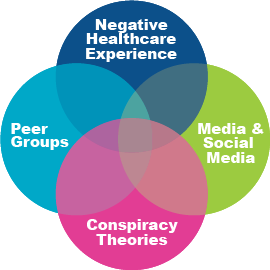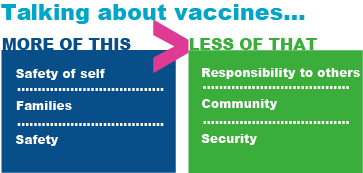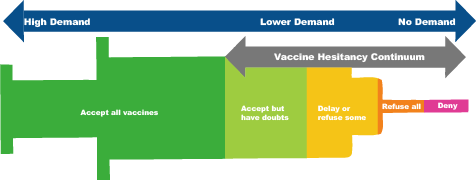So here’s the reality – we all start in the same place: We have loved ones we want to protect. We need to remember that commonality. Vaccine hesitancy starts with a question. The encounters along our way to finding answers are what form our opinions about vaccines.
Vaccine Hesitancy Continuum
Vaccine hesitancy is not an all-or-nothing scenario. In fact, it’s most frequently a space of confusion and questions than adamant beliefs. The people who accept vaccines but have doubts or who delay or refuse some are the people searching for answers.
It’s important to recognize the vaccine hesitancy continuum and know where someone is on it so you know what information might be most helpful.
Common causes of hesitancy
Hesitancy comes in all shapes and sizes, but there are generally four main causes:
Negative Healthcare Experience
Not all providers are well versed in addressing family concerns. Combine that with the fact that providers have less and less time to spend with patients, and we can sometimes leave a doctor’s office feeling like our concerns were not taken seriously. This can lead to looking elsewhere for answers.

Big Takeaway: If someone feels unheard by their healthcare provider, help them to have conversations with their healthcare provider. Most healthcare providers genuinely want to help their patients, but sometimes communication can be an issue. If communication does not improve the situation, encourage them to find a healthcare provider who is a better communication fit for them and can take the time to help them better understand vaccines.
Peer Groups
It’s human nature to want to feel like we belong. We are all influenced by our friends and family. So when an individual has people in their life who are not supportive of vaccines, it’s natural for that person to start to question vaccines as well.
Big Takeaway: Remember, the voices you hear are simply the loudest voices, not necessarily the majority voice. Often the vaccine conversation is led by a small, but vocal group who do not support vaccines. In order for the conversation to represent the majority, we need to be vocal! It’s time we start normalize talking about the benefits of immunization. We can be the peers people listen to!
Conspiracy Theories
Conspiracy theories may seem SO far-fetched to you that you cannot understand how anyone would believe them, but conspiracy theories are about much more than the actual theory itself. Conspiracy theories have a very strong emotional component to them and most experts agree that they stem from feelings of resentment and anger over injustices – whether real or perceived.
Big Takeaway: Stay calm and don’t be dismissive. Remember, these conspiracy theories are very real for the people who believe them. Instead, encourage critical thinking. Jovan Byford, a psychologist who is an expert in conspiracy theories notes that:
Many people who believe in conspiracy theories see themselves as healthy skeptics and self-taught researchers into complex issues. Present this as something that, in principle, you value and share. Your aim is not to make them less curious or skeptical, but to change what they are curious about, or skeptical of.
Ask questions and be patient. Conspiracy theorists do not believe these things overnight and you aren’t going to change thinking overnight either.
Media and Social Media
Yikes. Where to start on this one. Social media is probably the single biggest driver of vaccine hesitancy today. But both traditional and social media play a role in sowing seeds of doubt and amplifying misinformation.
Big Takeaway: You can share credible information on social media. The more truthful information shared, the less space for mis- and disinformation to take hold. But another great technique is to encourage someone to “unplug and have an actual conversation. Our peers are influential, our personal stories are impactful, and our friendship is important. Use those connections to help a person get information beyond their Facebook feed. Learn more in our toolkit about engaging on social media and check out our podcast on Social Media & Misinformation.
How people make decisions
Emotions
We all think we are independent, rational decision makers, but in truth, we’re not. There are five major factors in how we make our decisions. As we talk with people who are hesitant about vaccines, we should keep these factors in mind. We’re all ruled a little bit by our hearts rather than just our heads. And that’s okay. Emotions are important – it’s how we connect to others.
What emotions mean for vaccine decisions
Vaccines are about the health and safety of our families. Our families are dear to us, and that means vaccinating can be a very emotional decision. We need to understand and respect that. The facts are not enough on their own to make a decision about vaccines. We need to acknowledge and address the emotions that are driving vaccine decisions.

Time
We often hear someone say “I need more time to make this decision.” But actually, they don’t. They really, really don’t. Research shows that too much time actually decreases confidence. So the longer time it takes someone to make a choice, the less confident they are with their decision.

What time means for vaccine decisions
We need to make sure someone’s questions are answered quickly, directly, clearly, and compassionately. The longer a person struggles with a vaccine decision the more confusing and less confident they will feel.
Options
More is not always better. Research has shown that too many options can overwhelm people. “Choice overload” occurs when there are so many choices and an equally overwhelming number of outcomes from the decision. Too many options can be mentally draining because each choice must be weighed before making a decision.

What option-overload means for vaccine decisions
Instead of addressing a menu of options and concerns, try to get someone to pinpoint their biggest one and help them with that one issue.
Social Norms
Social norms are the behaviors, attitudes, and beliefs a community or society determines are acceptable. They are, more often than not, unwritten but powerful tools in decision making. For example, in the US, unless a movie theater is crowded we don’t sit next to strangers. It’s not a law or even something we teach our kids, it’s just a social norm. Yet most of us conform to it.

What social norms means for vaccine decisions
Vaccinating our families is actually already a social norm – most of us do it. But if we were more vocal about vaccinations as a norm, our voices could become a positive tool in decision making. Find opportunities to praise vaccination behavior and reinforce it as a positive social norm.
Herd mentality
The groups we belong to are important to us – we trust and love those in our circle. So it’s no surprise that we often conform to the groups to which we belong. That herd mentality can be both positive or negative depending on the behaviors and beliefs of our groups.

What herd mentality means for vaccine decisions
Herd mentality in groups that are not supportive of vaccines is very common. There is an expectation of conformity in beliefs. If you have loved ones that are part of a group that doesn’t support vaccinations, you can help to broaden their circle to include those with more supportive perspectives.

© Voices for Vaccines. Excerpts and links may be used by websites and blogs, provided that full and clear credit is given to Voices for Vaccines, with appropriate and specific direction and links to the original content. Parents, providers, advocates, and others may download and duplicate toolkits in print, without alteration, for non-commercial use and with full and proper attribution only.

